Introduction
Ever woken up one morning, staring at the ceiling, wondering why helping your best friend through their breakup left you feeling like you’d run a marathon emotionally speaking? Yeah, that’s empathy fatigue sneaking in, that sneaky burnout from caring way too deep for too long. It’s like your heart’s a sponge soaking up everyone’s pain until it’s wringing wet and heavy.
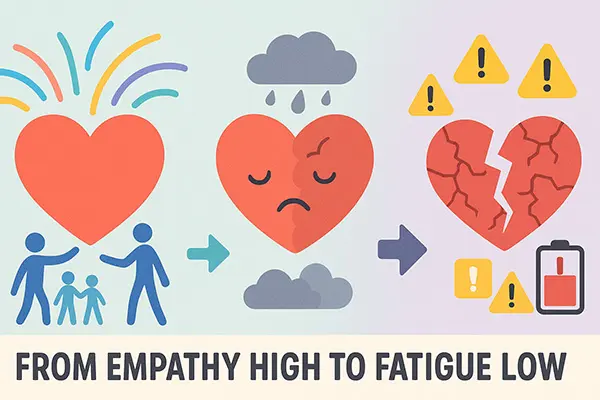
In this piece, we’ll unpack what it really is, spot those red flags before they knock you flat, dig into why it hits hard (especially if you’re one of those highly sensitive types), and yeah, toss in some real-life tips to shake it off. Think of it as your roadmap: first understanding the toll, then what causes it, and how to recover without losing that compassionate spark. Oh, and if you’re curious about building emotional boundaries, check out our take on self-care strategies for empaths it’s a game-changer for keeping your sanity. For a deeper science-backed read, head over to Psychology Today’s guide on compassion fatigue. Plus, we’ve got a quick online quiz coming up to check if you’re tipping into fatigue territory super easy, no strings attached.

This is the silent struggle of the highly sensitive being a beacon of light for others while feeling dim inside.
Understanding the Emotional Toll of Caring Too Much
You know that feeling when you’re at a family gathering, and your aunt’s spilling her guts about her rough week, and you’re right there, feeling every bit of her sadness like it’s your own? It’s beautiful, really, being able to connect like that. But man, it can drain you dry if you’re not careful.
I remember this one time in college, I was the go-to guy for my roommates’ drama heartbreaks, exam flops, you name it. By finals week, I was so wiped I could barely focus on my own stuff. That’s the emotional toll we’re talking about here; it’s not just tiredness, it’s like your soul’s battery is flickering low from absorbing too much. And for highly sensitive people? It’s amped up because your nervous system picks up on every little vibe in the room. Setting small boundaries early can make a huge difference, like saying “I hear you, but I need a breather.”

Funny thing is, society pushes this idea that more empathy equals better person, but hello, even superheroes need downtime. Think about it nurses, teachers, those folks in helping jobs they’re hit hardest. A buddy of mine who’s a therapist once told me, “It’s like carrying everyone’s backpack on top of yours.” And yeah, sometimes it leads to resentment bubbling up, which nobody wants. From a neuroscience angle, it’s all about mirror neurons firing overtime, making you literally feel others’ pain, but without recharge, cortisol spikes and hello, exhaustion.
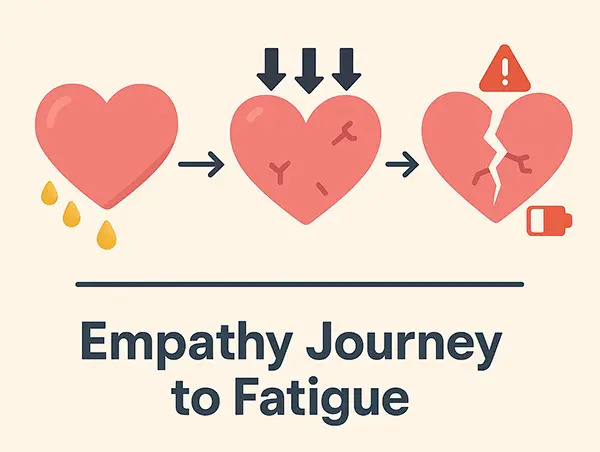
What Is Empathy Fatigue?
Okay, let’s break this down without all the jargon. Empathy fatigue is basically when your ability to care for others starts wearing thin because you’ve been dishing out too much emotional support. It’s not the same as regular burnout though they overlap ’cause this one’s tied to feeling others’ feels so intensely it zaps your energy. I mean, imagine being a sponge in a stormy sea; at first, you’re absorbing, helping, but eventually, you’re just soggy and useless. For empaths, it’s a real thing, and it can sneak up, leaving you numb or irritable when you used to be all heart.
Defining Empathy Burnout and Its Impact
So, empathy burnout, or compassion fatigue as some call it, hits when prolonged exposure to others’ suffering overloads your system. It’s common in caregivers, but hey, even everyday friends or parents can get it. The impact? Well, it messes with your relationships suddenly you’re snapping at loved ones or your health, like constant headaches or that foggy brain feeling.
One study I recall from my psych class days showed how it reduces job satisfaction big time in pros like social workers. And get this, it can even lead to depersonalization, where you start seeing people as problems instead of humans. Yikes. But the flip side? Recognizing it early lets you rebuild that empathy muscle stronger.
From a psych perspective, it’s linked to hormonal shifts adrenaline and cortisol going haywire without enough oxytocin to balance. A quick real-life example: my neighbor, a vet tech, loved animals but after years of euthanasias, she felt detached. She said, “It was like my heart put up walls.” If that sounds familiar, you’re not alone.
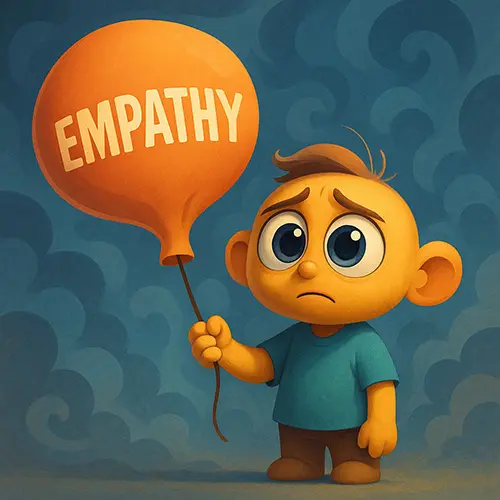
Why Empathy Can Feel So Exhausting
Why does it tire you out? Simple: your brain’s working overtime. For highly sensitive peopl e, sensory input is cranked up every sigh, every tear registers deep. Add in modern life with constant news feeds blasting tragedies, and boom, overload. It’s evolutionary too; back in the day, empathy helped tribes survive, but now? It’s non-stop. I once spent a weekend volunteering at a shelter, and by Sunday, I was emotionally toast, craving solitude like air. That’s the exhausting part no off switch.
Physically, it shows in sleep issues or that perpetual knot in your stomach. Empathy can be exhausting because it activates the same brain areas as personal pain, leading to real fatigue. And for women, who often shoulder more emotional labor, it’s even tougher hormones like estrogen amp up sensitivity. But hey, it’s not all doom; understanding this lets you pace yourself.
🟨 Box: Key stats on empathy fatigue prevalence among caregivers (e.g., 40-70% in helping professions).
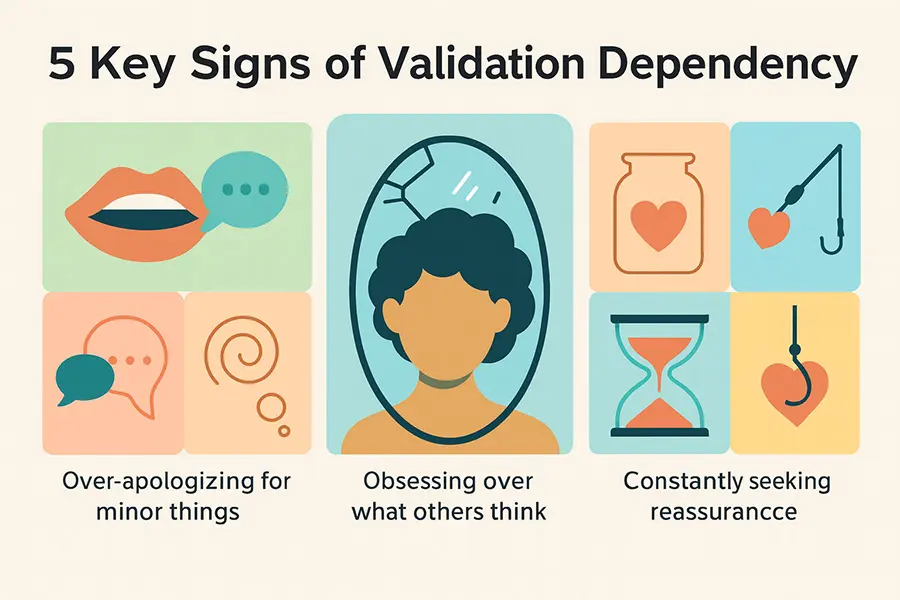
Signs and Symptoms of Empathy Fatigue
Spotting the signs early is key, ’cause ignoring them just digs the hole deeper. It’s like your body’s whispering “hey, slow down” before it shouts.
Emotional and Physical Indicators
Emotionally, you might feel detached, like watching life through glass nothing hits quite the same. Or irritability creeps in; small things set you off. Physically? Exhaustion that sleep doesn’t fix, headaches, or even gut issues from stress. I had a phase where every sad story on TV made me zone out, and my back ached from tension. It’s your system saying overload.
From neuroscience, it’s the amygdala on high alert, pumping stress hormones. And culturally, in places where “tough it out” is the motto, we miss these indicators big time.
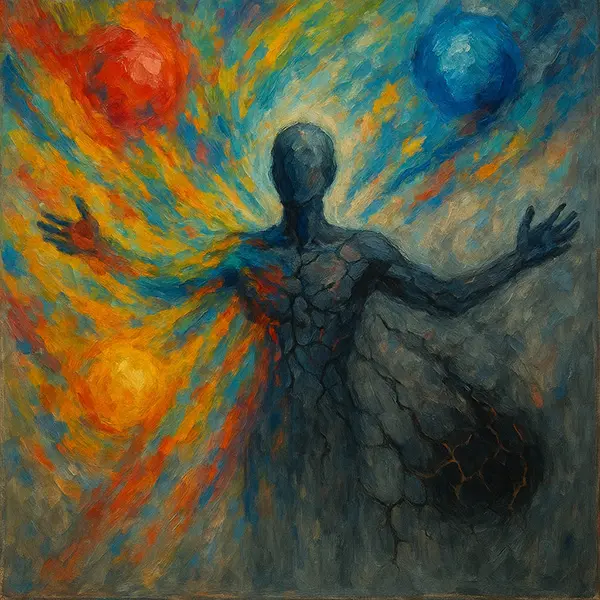
Three Common Signs of Caregiver Stress
First up: emotional numbness. You care, but can’t feel it anymore like hitting a wall. Second, resentment toward those you help; “Why me?” thoughts pop up. Third, withdrawal from social stuff; parties sound like chores. A nurse friend described it: “I loved my patients, but suddenly I dreaded shifts.” Spot these? Time to pause.
Symptoms of Caring Too Much and Draining Factors for Empaths
Caring too much shows in constant worry loops or guilt for not doing enough. Draining factors? Lack of boundaries, high-exposure jobs, or personal history making you overcompensate. For empaths, it’s amplified sensing unspoken pain adds layers.
In the LGBT+ community, where folks often navigate extra emotional loads from discrimination, this can hit harder; think supporting friends through coming-out struggles while dealing with your own. “It’s double the drain,” as one pal put it. But acknowledging it? First step to recovery.
Add in sleep disruptions or appetite swings, and you’ve got the full picture. Evolutionarily, empaths were tribe healers, but today, without rituals to release, it builds up.
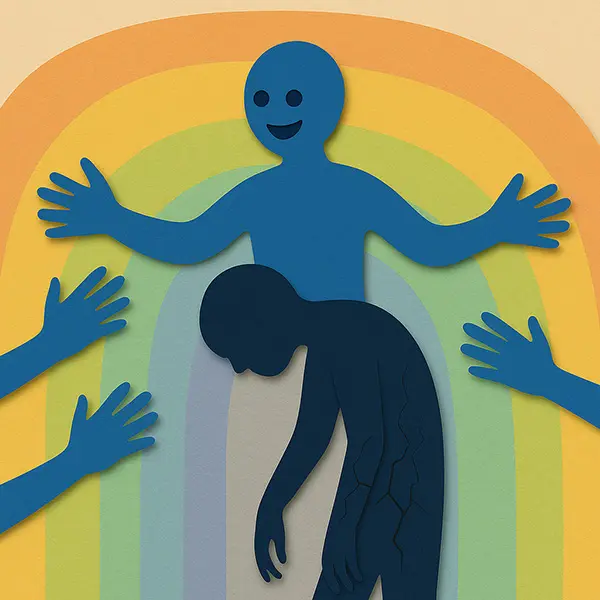
Causes and Roots of Empathy Fatigue
Diving into causes helps prevent it, right? It’s not random; roots run deep.
Why Highly Sensitive People Are More Prone
Highly sensitive people process emotions deeper thanks to genetics and that amped sensory system. Noises, moods, all hit harder, so empathy turns to fatigue quicker. It’s a gift and curse; great for art or therapy, but exhausting in crowds. I know, ’cause at concerts, I’d feel the whole vibe and crash after. Science says HSPs have more active insula regions, feeling pain vicariously stronger. Ignoring your limits just speeds it up.
Professions Prone to Empathy Fatigue
Think therapists, doctors, teachers constant emotional input. Social workers too, dealing with trauma daily. Rates soar here; one stat showed 50%+ in mental health fields. Even vets or first responders. If you’re in one, self-checks are musts.
For more on balancing work empathy, peek at our emotional resilience in high-stress jobs.

Role of Trauma in Reducing Empathy
Trauma can flip the script, reducing empathy as a shield your brain says “no more pain.” Past hurts make you guarded, leading to fatigue faster. It’s tied to PTSD often; unresolved stuff drains reserves. A quick example: after a bad breakup, I found it hard to empathize with friends’ relationship woes without feeling triggered.
This ties into post-trauma disorders big time. For rebuilding, check our piece on Healing from Emotional Trauma: Rebuilding Empathy After Pain. And externally, Verywell Mind’s trauma and empathy article nails it.
From psychobiology, trauma alters dopamine and serotonin, dulling emotional responses. But healing? It restores that balance. 😊
Comparing Empathy Fatigue to Similar Issues
Okay, so you’ve probably heard folks toss around terms like compassion fatigue or burnout, and you’re wondering, wait, isn’t that all the same as empathy fatigue? Not quite, but they’re cousins in the emotional exhaustion family. I remember chatting with a nurse pal over coffee she’d say her job left her numb, but couldn’t pin down if it was from feeling too much or just the endless shifts.
Turns out, empathy fatigue hits when you’re soaking up emotions like a sponge, especially if you’re highly sensitive, while the others have their own flavors. Let’s break it down to see the overlaps and where they split. For more on spotting burnout in daily life, swing by our post on spotting emotional burnout early. And if you wanna dive deeper into the psych side, check out Talkspace’s take on compassion fatigue vs. burnout.
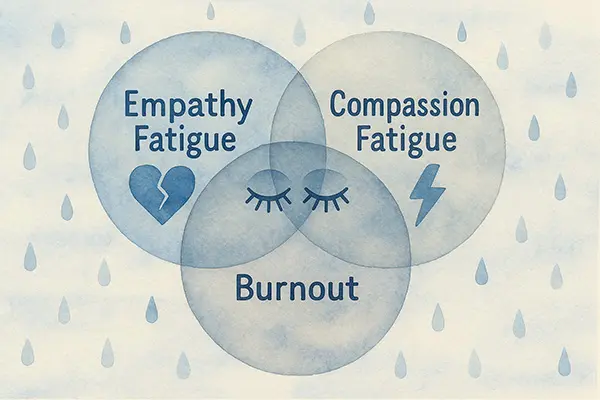
It’s tricky ’cause these can blend, but getting the differences straight helps you tackle the right fix. Like, empathy fatigue might leave you avoiding deep chats altogether, while burnout has you dragging through any task. A quick neuroscience nugget: all involve cortisol spikes, but empathy fatigue amps up mirror neurons more, making you literally echo others’ pain. In the LGBT+ community, where folks often navigate extra layers of emotional support like helping a friend through identity struggles amid discrimination it can morph into any of these, hitting harder if you’re already sensitive. “I felt every rejection like my own,” a buddy shared once, blurring those lines.
🟨 Table: Comparison of empathy fatigue vs. compassion fatigue vs. caregiver burnout (columns: definitions, signs, causes, recovery).
| Aspect | Empathy Fatigue | Compassion Fatigue | Caregiver Burnout |
|---|---|---|---|
| Definitions | That drained feeling from absorbing too many emotions, like your heart’s on overload from feeling everything deeply common in empaths and HSPs. | Emotional residue from helping those in trauma, kinda like second-hand stress from caring intensely, often in pros. | Total wipeout from the grind of caregiving, hitting physical, mental, and emotional levels after prolonged demands. |
| Signs | Numbness to feelings, irritability at small stuff, physical aches like headaches from emotional weight, or zoning out in convos. | Detachment from patients or loved ones, resentment bubbling up, sleep troubles, or that foggy brain haze. | Constant fatigue that sleep don’t fix, snapping at folks, loss of interest in hobbies, or feeling hopeless about tasks. |
| Causes | High sensitivity cranked up by constant vibe-picking in crowds or news feeds, plus no boundaries letting emotions flood in. | Exposure to others’ suffering day in day out, like in nursing or therapy, with little time to process the trauma vibes. | Overloaded schedules, lack of support, endless responsibilities piling on without breaks, often in family caregiving roles. |
| Recovery | Setting boundaries, mindfulness to observe not absorb, self-care rituals like journaling aim for recharge without guilt. | Professional support like therapy, peer groups, rotating duties to lessen exposure, and building resilience through hobbies. | Time off, delegating tasks, exercise and nutrition tweaks, seeking help from networks to lighten the load long-term. |
From what I’ve seen in friends’ stories, mixing these up can delay healing better to ID yours spot on. Oh, and if burnout’s your jam, our daily routines to beat burnout has some solid tips.
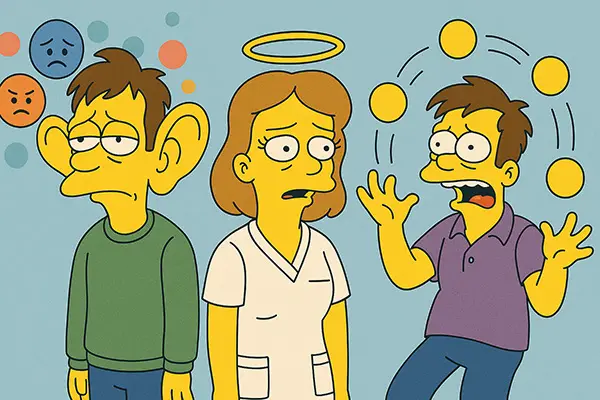
Stages of Empathy Fatigue and Improvement
Ever feel like your caring meter goes from full blast to zero in phases? Yeah, empathy fatigue doesn’t hit all at once it’s a sneaky progression, and knowing the stages can be a game-changer. Think of it as a rollercoaster: starts thrilling, ends queasy. I once noticed this in my own volunteering gig at a shelter; at first, I was all in, then bam, irritation set in. Mapping it out helps you jump off before the big drop. For a related read on emotional cycles, peek at understanding emotional cycles in sensitivity.
The 5 Stages of Compassion Fatigue
Alright, let’s lay out those five stages often called compassion fatigue stages, but they fit empathy fatigue like a glove since the empathy overload fuels it. First, the Zealot Phase: You’re super enthusiastic, diving headfirst into helping, feeling like a hero with endless energy. Like that time I signed up for every shift, buzzing with purpose.
Then comes Irritability Phase: Little things bug you, chats feel draining, maybe you snap or cut corners. The Withdrawal Phase kicks in next you pull back, avoid social stuff, feel detached like watching life on mute. Zombie Phase is rough: Numb, cynical, going through motions like a robot, errors creep in ’cause you’re checked out. Finally, Renewal Phase if you catch it or exhaustion if not where you seek help and start rebuilding. Watch for that zombie vibe; it can lead to deeper issues if ignored. From a psych angle, these stages tie to dopamine dips and adrenal fatigue, hormones going haywire from sustained empathy hits.
In queer spaces, where community support often means absorbing collective traumas like discrimination stories, these stages can accelerate folks might hit withdrawal faster from the added emotional load.
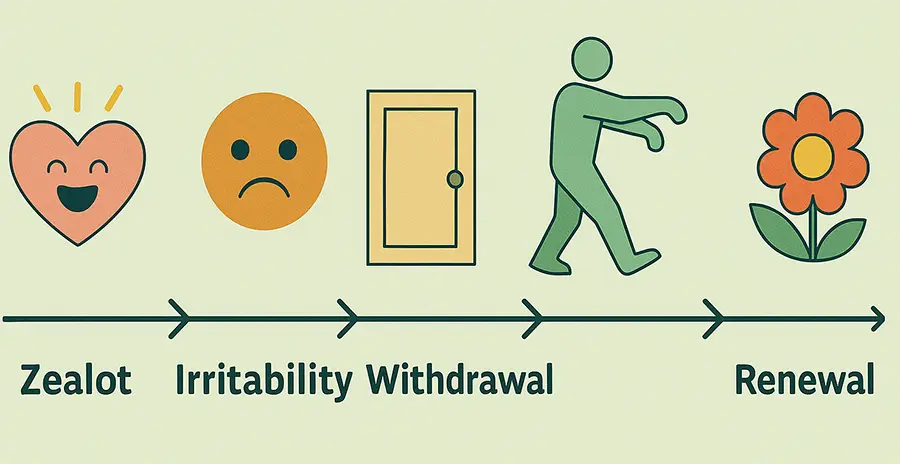
Steps Toward Recovery and Change
Turning it around? It’s doable with intentional steps. Start by acknowledging you’re in a stage denial keeps you stuck. Then, prioritize self-compassion; treat yourself like you’d a friend. Build in daily breaks, like a 10-minute walk listening to birds chirp. Therapy or coaching helps unpack the buildup. Reconnect with joy sources hobbies, nature. Set goals small: one boundary a week. I tried this after my shelter burnout; journaling stages helped me track progress. Scientifically, mindfulness rewires the brain, boosting oxytocin to counter cortisol neuroscience backs it as a reset button. And hey, if you’re thinking “this won’t work for me,” give it a shot; small changes compound.
Practical Tools and Exercises for Recovery
Now, let’s get hands-on tools that actually work, not fluffy advice. I’ve tested a few during my own dips, like breathing exercises that snapped me out of absorption mode. These aren’t quick fixes but build resilience over time. For more exercises, our mindfulness exercises for empaths is packed with goodies. Externally, BetterUp’s empathy fatigue guide has solid insights.

A conscious, mindful break is one of the most effective exercises to reset your nervous system and build resilience. It’s not about being lazy; it’s about strategically recharging so you can return to your work with more focus and energy. This is how you build sustainable performance.
How to Fix Empathy Fatigue
Fixing it? More like managing, ’cause empathy’s a gift. First, ID triggers journal what drains you most. Then, practice detachment: visualize a shield during heavy convos. Seek support groups; sharing lightens the load. I fixed mine by limiting news intake cut it to 15 mins a day, felt lighter instantly. Recovery often takes weeks to months, depending on depth, but consistent tools speed it up. Add in physical stuff like yoga; it grounds you. For HSPs in helping roles, rotate tasks to avoid constant exposure.
Building Emotional Boundaries
Boundaries are your bestie here. Start simple: say “I can listen for 10 minutes.” Visualize a bubble around your energy. Role-play with a mirror if it feels awkward. A therapist friend taught me the “no” script: “I care, but I need space right now.” It saved my sanity during family dramas. In the LGBT+ world, where boundaries might feel selfish amid community needs, remember: protecting your energy lets you show up better long-term. Evolutionarily, boundaries mimic animal territories keeps the pack healthy without overload.

Daily Practices for Emotional Hygiene
Emotional hygiene? Like brushing teeth for your mind. Morning: Ground with deep breaths, inhale calm, exhale others’ stuff. Afternoon: Quick check-in am I absorbing or observing? Evening: Gratitude list to shift focus. Add walks in nature; the rustle of leaves resets me. Try the “emotion dump” journal: scribble feelings, then rip the page. 😅 Kinda cathartic, right? For science: these practices lower amygdala activity, per psych studies, calming the empathy storm.
🟨 Infographic:
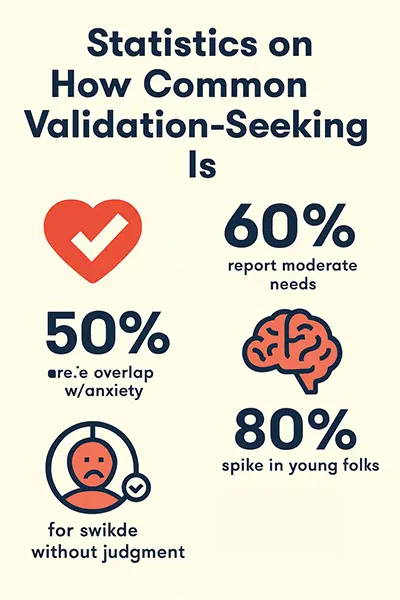
Case Studies and Real-Life Scenarios
Real stories make this hit home, don’t they? Seeing how others navigated empathy fatigue reminds us we’re not alone. I’ve collected a few from chats and reads anonymous, but raw.
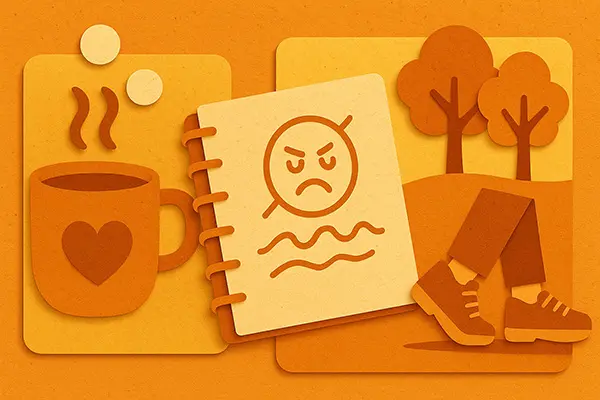
Stories from Caregivers and Sensitive Individuals
Take Sarah, a social worker in her 30s: She started zealous, absorbing clients’ traumas like her own, especially queer youth facing rejection. By year three, irritability hit she’d dread sessions, feel numb. “It was like my empathy tank ran dry,” she said. Recovery? Therapy and boundaries; now she witnesses, not absorbs. Or Mike, an HSP teacher: Constant student dramas left him zombied out, snapping at home.
A break and mindfulness flipped it he journals daily now. Then there’s the animal sanctuary caregiver: Witnessing daily suffering led to detachment, but peer support brought renewal. These tales show: Catch early, act, and empathy rebounds stronger. If this resonates, explore real stories of emotional recovery. And for more, Sensitive Refuge’s HSP compassion fatigue piece.

Checklist for Managing and Preventing Empathy Fatigue
Alright, let’s get practical with a checklist that you can actually use, like right now, to keep tabs on your empathy levels before they tank. I remember when I first put something like this together for myself after a rough stretch helping out at a community center; it was eye-opening how many boxes I ticked off without realizing.
This isn’t about judging yourself, nah, it’s more like a friendly nudge to check in and tweak things. For HSPs, who pick up on every little emotional ripple, this can be a lifesaver prevents that slow creep into overload. Oh, and if you’re digging into more self-check tools, hop over to our empath self-assessment quiz for a deeper dive. Externally, the American Psychological Association’s burnout checklist ties in nicely here.
Think of it as your personal radar; go through these questions weekly or when you’re feeling off. If you’re hitting mostly yeses, time to pump the brakes and amp up those boundaries we talked about earlier. In the queer community, where folks often carry extra emotional weight from shared traumas like discrimination or family rejection, this checklist hits different might reveal how absorbing those stories adds up quicker.
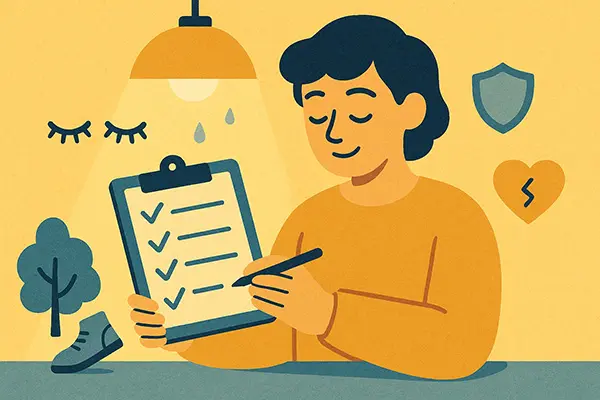
“I didn’t realize how much I was holding until I saw it listed out,” a friend once told me after trying something similar. From a neuroscience angle, these signs link to overfired mirror neurons, spiking cortisol without enough downtime to reset; hormones like oxytocin can buffer if you catch it early.
🟨 Checklist: Self-assessment for empathy overload (e.g., 10 yes/no questions on signs and boundaries).
- Do you feel drained after listening to friends’ problems, like your energy’s been sucked out?
- Have you noticed yourself snapping at loved ones over small things lately?
- Are you avoiding social gatherings because they feel overwhelming?
- Do headaches or stomach knots pop up after emotional conversations?
- Have you set any “no” boundaries this week, or just said yes to everything?
- Is sleep dodging you, with worries about others keeping you up?
- Feel numb when someone shares good news, like you can’t muster excitement?
- Are you resenting the people you’re helping, thinking “why me again”?
- Skipped self-care routines because others’ needs came first?
- Notice a drop in your own hobbies, replaced by constant caring mode?
Score it simple: 5+ yeses? Ramp up those daily practices we mentioned, like journaling or walks. Less than that, you’re managing well keep it up!
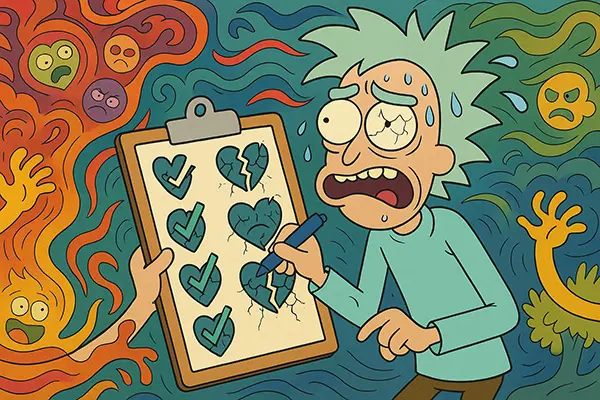
Warning Signs and When to Seek Professional Help
Spotting those bigger red flags is crucial, ’cause sometimes empathy fatigue masks deeper stuff or spirals into something that needs pro input. I had a phase where I thought it was just tiredness from helping family through tough times, but nope, it was edging into real detachment that affected everything. This section’s about knowing when to wave the white flag and get help no shame in it. For more on spotting when emotions go haywire, check our emotional warning signs guide.
When Should You Stop Being a Caregiver?
Tough call, right? But if you’re at the point where caring feels like it’s chipping away at your core self, it might be time to step back. Like, if resentment’s your default or you’re fantasizing about vanishing from responsibilities, that’s a sign. A therapist buddy of mine quit her practice temporarily after years of absorbing clients’ traumas; she said, “It was either stop or lose who I am.” For HSPs, this hits when the sensory overload from others’ pain overrides your own needs think constant anxiety spikes or physical ills that docs can’t pin down.
If symptoms linger past a month despite self-care, stop pushing. In LGBT+ circles, caregiving often means supporting through identity crises or hate incidents, which can accelerate this; pausing doesn’t mean abandoning community, it means recharging to help better later.
From psychobiology, prolonged empathy drain alters serotonin levels, mimicking depression so stopping early prevents that slide. Practical tip: Delegate roles, like passing on support groups to others, and monitor how you feel after.
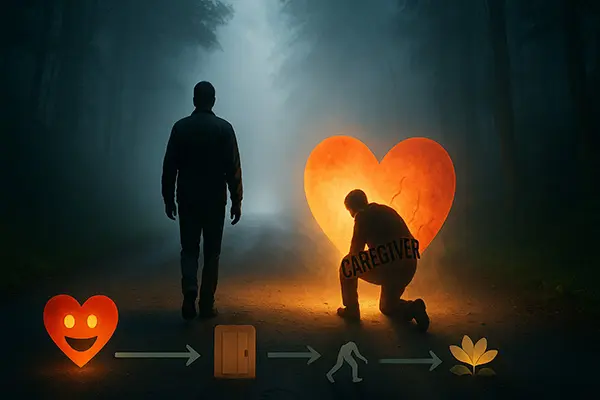
Red Flags Indicating Deeper Issues Like Personality Disorders
Okay, here’s where it gets serious: if empathy fatigue’s mixing with wild mood swings, intense fear of abandonment, or black-and-white thinking about people, it could point to something like borderline personality disorder lurking underneath. Not saying it’s always that, but unresolved trauma amps up sensitivity, making fatigue worse.
I recall a college roommate who seemed super empathetic but would flip to cold detachment; turned out, past stuff was fueling it. Red flags? Chronic emptiness, unstable relationships, or self-harm thoughts creeping in amid the fatigue.
This overlaps with post-trauma responses, where empathy gets warped as a defense. For deets, see our linked piece on Personality Disorders and Emotional Overload. And externally, Verywell Mind’s BPD and empathy article breaks it down well. If these ring bells, seek a pro ASAP therapy like DBT can untangle it.
Research, Studies, and Statistics on Empathy Fatigue
Diving into the science helps ground all this, showing it’s not just “in your head.” Recent studies paint a clear picture: empathy fatigue’s rampant in caring roles, and HSPs are wired for it due to brain diffs. One key takeaway? It’s not a flaw; evolutionarily, sensitivity helped survival in tribes, but modern life’s non-stop demands flip it to fatigue. Let’s unpack some findings.
Key Findings from Recent Studies
Lately, research from 2023-2025 highlights how compassion fatigue basically empathy fatigue’s twin spikes in high-stress jobs, linking to resilience and moral sensitivity. For instance, a 2025 study on nurses found fatigue ties to lower humanistic care, but building psychological resilience buffers it. Another from teachers showed 1 in 4 experiencing reduced compassion, hurting well-being and job satisfaction.
For HSPs, fMRI scans reveal heightened activity in empathy brain regions like the insula and cingulate, making them prone to overload from others’ emotions especially positives from close folks, per a classic study. 😅 Kinda ironic, right? Your big heart’s superpowered, but needs shielding.
Hormonally, it’s cortisol overload from mirror neurons firing too much, leading to sleep issues and burnout. A 2024 pub health piece tied empathic fatigue directly to sleep disorders, with occupational identity as a moderator. In queer communities, studies suggest added layers from shared traumas accelerate this, though more research needed. Overall, findings push for early intervention: self-compassion flips fatigue to satisfaction over time.
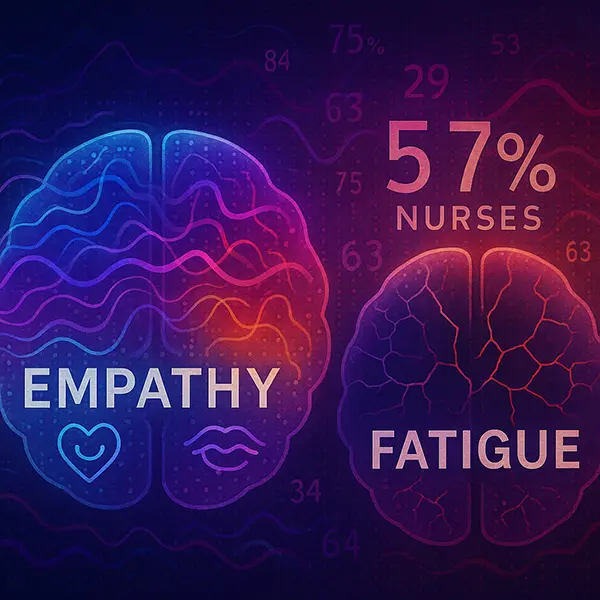
🟨 Table: Statistics on empathy fatigue in various professions (e.g., nurses, therapists).
| Profession | Prevalence Rate | Key Notes from Studies |
|---|---|---|
| Nurses | 57% in clinical roles; up to 46.6% moderate in interns | High in oncology/ER; ties to long hours, per 2025 BMC Nursing. |
| Therapists/Mental Health Pros | Significant rise noted; ~40-50% in high-stress settings | Linked to client traumas; APA 2022 highlights burnout overlap. |
| Teachers | 25% (1 in 4) report compassion fatigue | Reduced well-being; 2025 Springer study on teacher-student interactions. |
| Doctors/Physicians | High risk in young pros; 15-19% in rescuers | COVID-era spikes; Frontiers 2024 on empathy fatigue impacts. |
| Other Helping Roles (e.g., Social Workers) | 40-70% overall in helping professions | Scoping reviews show variance by exposure; PMC 2025. |
These nums underscore why prevention’s key don’t wait till you’re in the stats.
Frequently Asked Questions (FAQ)
Got burning questions? We’ve rounded up the common ones, tackling that inner doubt like “Is this just me being weak?” Nah, it’s real, and understanding it eases the guilt.
Feeling swamped by everyone’s emotions? That’s the problem leads to constant burnout and that nagging guilt of not doing enough. It amps up anxiety, making you question your worth when you can’t fix it all. But hey, it’s empathy fatigue, not a personal flaw; recognize it as your sensitivity’s downside, and tools like boundaries turn it into a strength. With practice, you can care deeply without draining dry many recover fully in weeks.
Numbness after endless caring hits hard, right? The problem: You go cold, feeling like a selfish jerk when you used to be all heart. It stirs guilt and strains bonds, whispering “you’re broken.” Target: It’s your brain’s protective shutdown, not you; recovery rebuilds that capacity through rest and therapy.
A study showed this as “empathic distress fatigue,” where high empathy flips to detachment for survival. 😊 Start with small reconnections, like pet cuddles.
Confused by the terms? Problem: Mix-ups delay getting the right help, leaving you stuck in exhaustion. It frustrates when generic advice flops. Yes, it’s a burnout flavor from empathy overload, per research emotional drain vs. just workload. Target: Focus on empathy-specific fixes, like witnessing techniques, to nip it.
Guilt over fading warmth? That’s the rub problem: It wrecks relationships, making you isolate more. Agitate: Feels permanent, like you’ve lost your spark. No, it’s self-protection; set boundaries to restore that warmth sustainably. HSP brains show this as overactivation leading to shutdown, but it’s reversible.
Fear it’s forever numb? Problem: Blocks long-term caring, hitting your identity. Agitate: Impacts jobs and joy. With tools, yep capacity expands. Studies say time perspective helps: initial stress builds resilience. Daily hygiene practices resolve it over months.
Overlaps confusing you? Problem: Wrong fixes worsen it. Agitate: Wastes time on ineffective stuff. Target: Empathy version’s from absorbing emotions, not just tasks focus on detachment exercises vs. workload tweaks. Brain-wise, it’s mirror neurons vs. general stress.
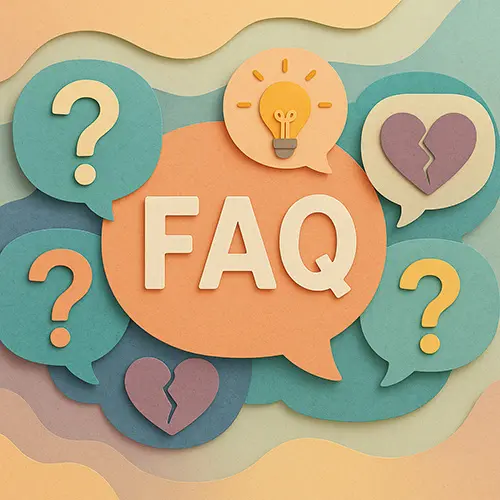
Resources and Credible Links
Wrapping up, here’s your toolkit for digging deeper books, sites, and pros to lean on. Don’t go it alone; these have pulled me through foggy times.
Recommended Books and Online Tools
Start with “The Highly Sensitive Person” by Elaine Aron gold for understanding your wiring. Or “Compassion Fatigue” by Charles Figley, packed with pro insights. Online? Try the Compassion Fatigue Awareness Project for quizzes and tips. For HSPs, HighlySensitiveRefuge.com has free resources. Our daily empathy recharge app guide pairs well too.
Professional Support Options
Therapy’s key look for counselors specializing in HSP or burnout via Psychology Today’s directory. Groups like NAMI offer peer support. In LGBT+ spaces, orgs like The Trevor Project provide tailored help for emotional loads. Start with a session; it changes everything. For more, our finding therapist for empaths.

If this resonated, why not try that checklist today? Share your score in comments or grab our free empathy quiz at pathserenity.com let’s keep that heart strong without the burnout. You’ve got this! 🚀
✨ Last updated on 06.10.2025
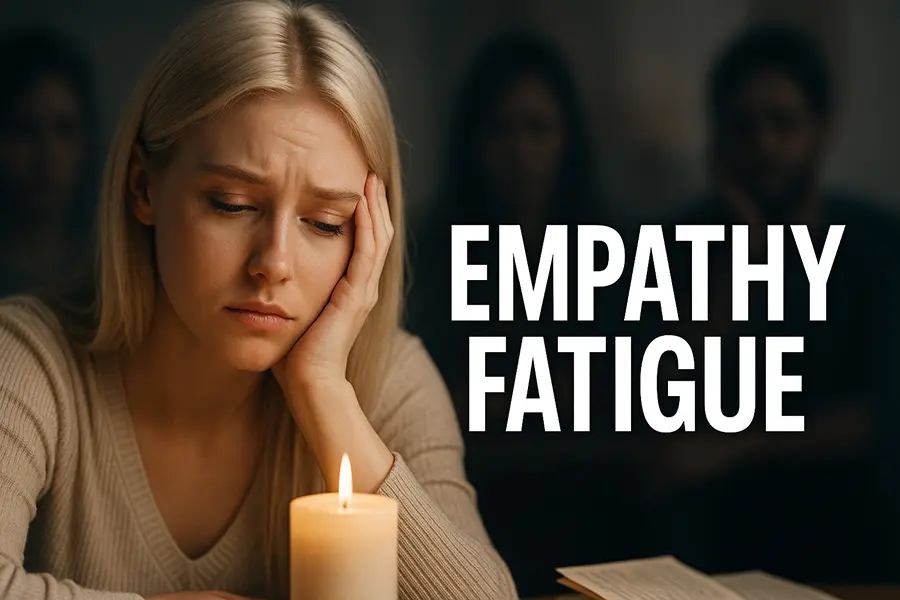










Leave a Reply